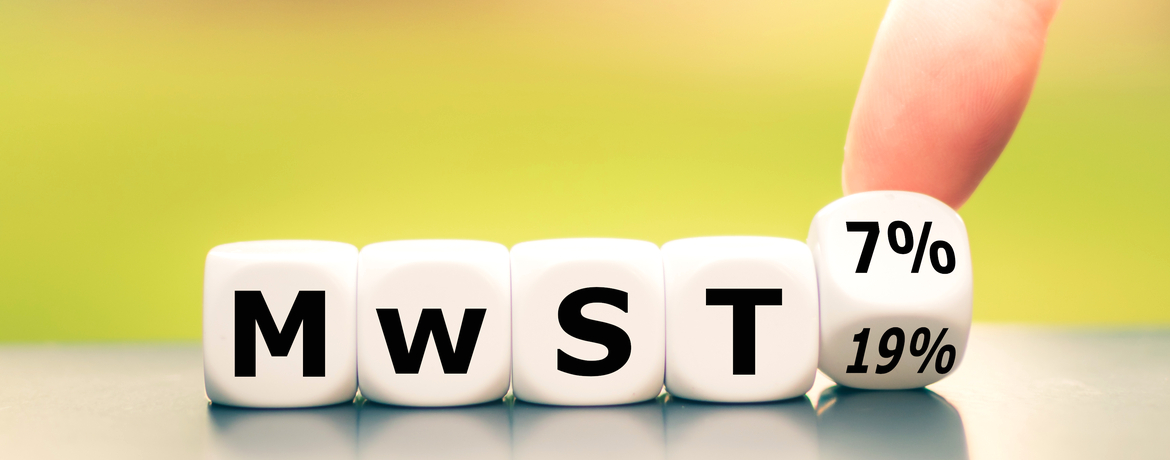On 31.12.2020 the low tax phase of the VAT ended. For all transactions carried out from 01.01.2021, the former VAT rates of 19% or 7% will apply again.
However, the reduced rate of 7% will be applied to restaurant and catering services (excluding beverages) in the period from 01.01.2021 to 31.12.2022.
In addition to practical implementation difficulties, the temporary tax rate reduction has given rise to numerous issues in terms of substantive law.
We have summarized all questions and answers on the changes and adjustments to VAT for you!
VAT change & adjustments: Return to 19% or 7% from 01.01.2021!
In addition to practical implementation difficulties, the temporary reduction in VAT rates has given rise to a wide range of questions in terms of substantive law. The BMF has already taken this into account in its letter of 30 June 2020. The BMF letter of November 4, 2020, which has now been published, supplements the previous BMF letter and primarily addresses the issues associated with the return to the “normal tax phase” as of January 1, 2021.
The regulations taken up are to be welcomed to a large extent, at least they lead to an increased degree of legal certainty. Nevertheless, many questions of practical relevance still cannot be answered with legal certainty.
VAdvance and down payment invoices
For advance payments and down payments received in the “low tax phase”, the VAT rates of 16 % and 5 % respectively are to be applied. However, if it is certain that the respective service will not be provided until after December 31, 2020, the VAT rate of 19% or 7% applicable at that time can already be applied and invoiced without objection. The recipient of the service is entitled to deduct the input tax. The BMF is thus primarily clarifying the legal uncertainty that previously existed with down-payment invoices in such constellations.
Use should also be made of this non-objection provision. This is because the BMF clarifies that advance payments or down payments invoiced before 01.01.2021 and received after 31.12.2020 are taxable at a rate of 19% or 7%, even if the invoice shows a lower tax rate. Under the other conditions, the recipient of the service is entitled to deduct the input tax only in the amount of the tax shown. This situation must be avoided.
Construction and engineering services
For construction and engineering services, the tax rate is determined by the time the service is rendered. The service is deemed to have been rendered when it has been completed in full and accepted by the client. If acceptance of the service is provided for by contract or by law, this is decisive for the time of performance. This means that even if such services have taken several weeks or months in 2020 but are not accepted until 2021, the 19% VAT rate applies.
The same applies to permanent services such as maintenance and license agreements. In this case, the contractual agreements must be used to check which performance period has been agreed. If a uniform performance period ending in 2021 has been agreed, the tax rate of 19% or 7% applies. If monthly periods have been agreed or are used as the basis for billing, the reduced tax rate of 16% or 5% will be applied for the months July to December 2020. Any invoices issued at the beginning of 2020 with the regular tax rate can be corrected for the second half of 2020 if the billing or service periods were agreed accordingly.
VAT voucher for a bindingly ordered item
In addition, the BMF specifies demarcation characteristics of single-purpose vouchers to mere down payments or advance payments. When issuing single-purpose vouchers, the place of performance and the tax due for these transactions are fixed. However, the voucher is not linked to an individual service in such a way that there would be an individualized unit debt for which the voucher would have to be redeemed. If the individual, concretized object of performance is determined, it is no longer a payment for a voucher, but a down payment or advance payment within the meaning of Section 13 (1) no. 1 letter a sentence 4 UStG.
Special matters
In addition, there are simplifications and clarifications for the following areas:
- Reimbursement of deposit amounts
- Granting of annual bonuses
- Taxation of electricity, gas, water, cooling and heat supplies as well as wastewater disposal (simplification regulations of the BMF letter dated June 30, 2020 also apply to EEG feed-in and grid usage. It is irrelevant whether the service recipient is an end consumer or a utility company).
- Taxation of passenger transportation by rail, regular motor vehicle services and trolleybus services.
- Special and compensatory payments in the case of rental or leasing contracts.
- Applicable tax rate in the case of total margin formation according to in the case of travel services
- Differential taxation in accordance with § 25a (4) UStG
- Newspaper and magazine subscriptions
BREXIT – Expiry of the transition period on 31.12.2020
The United Kingdom left the EU on February 1, 2020. Under VAT law, the EU regulations still applied until the end of the transitional period on December 31, 2020. The agreement reached between the EU and the United Kingdom on December 24, 2020 does not affect the original withdrawal agreement with regard to VAT. As of Jan. 1, 2021, sales in the trade of goods and services with Great Britain and in the trade of services with Northern Ireland will be subject to the VAT regulations applicable to the third-country territory. An exception applies to trade in goods with Northern Ireland, which will continue to be subject to the rules for intra-Community trade.
Mini-One-Stop-Shop (MOSS) becomes One-Stop-Shop (OSS) as of 01.07.2021
The mini-one-stop store procedure will be replaced by the one-stop store. In the future, not only services provided electronically, telecommunications, radio and television services, but also intra-Community distance sales and imports with a material value of EUR 150 or less can be reported via OSS. The procedure can only be used uniformly for the entire EU.
Mail order becomes distance selling as of 01.07.2021
For intra-Community distance selling, the previous country-specific delivery thresholds will be eliminated and replaced by a uniform EU de minimis threshold of EUR 10,000. The new threshold applies to all deliveries to other member states and is therefore not limited to deliveries to a specific member state.
Distance selling from third country from 01.07.2021
The tax exemption for small value consignments up to EUR 22 from the third country is abolished. However, the import of consignments with a material value of EUR 150 or less is tax-exempt under Section 5 (1) No. 7 UStG if the outgoing transaction is reported in the OSS.
Fictitious series transaction for sales via electronic interface (e.g. online marketplace) as of 01.07.2021
Section 3 (3a) of the German Turnover Tax Act (UStG) creates a presumption of a chain transaction between the online merchant, the electronic interface and the end customer in the following cases:
- Delivery of an item whose transport or dispatch begins and ends in the Community territory by a trader not established in the Community territory to a non-trader.
- Remote sale of goods imported from the third country territory in consignments with a material value of EUR 150 or less.
ASequence of relevant non-objection regulations
On 18.09.2020, the BMF published the long-awaited letter on the retroactive effect of invoice adjustments and on the deduction of input tax without a proper invoice. For invoice corrections submitted by 31.12.2020, the BMF provides for a non-objection rule. According to this, the input tax deduction for invoice corrections could be claimed until 31.12.2020 in the taxable period in which the corrected invoice was issued. As of 01.01.2021, the input tax deduction can only be claimed in the taxable period in which the original invoice was issued.
On 02.11.2020, a BMF letter was published on the statutory regulation in Section 3 (13) to (15) UStG on the VAT treatment of vouchers. The regulation is applicable retroactively to 01.01.2019. However, a non-objection rule (not specified in more detail) applies until 02.02.2021.
No written official confirmation of foreign VAT ID by BZSt as of 01.01.2021
The BZSt will no longer send written official confirmations of foreign VAT IDs. It is still possible to query foreign VAT IDs via the BZSt web portal. Entrepreneurs should keep appropriate proof of this (e.g. archiving BZSt data record, screenshot, printout).
Extended submission deadline for 2019 annual sales tax return
The deadline for filing 2019 annual sales tax returns prepared by tax advisors is extended from Feb. 28, 2021, to Aug. 31, 2021.
Crisis situations require quick help & support
Further helpful information can be found at the ACCONSIS Corona Task Force Service.
‚ACCONSIS Corona Task Force‘ by e-mail
If you would like to be regularly informed about the latest news of the ‘ACCONSIS Corona Task Force’ by e-mail, please let us know and sign up for our special “Corona” newsletter:
Questions about the change of the value added tax?

Dipl. Fin.-W. (FH), Steuerberater
Rolf Hackspiel
Geschäftsführer der Acconsis GmbH Steuerberatungsgesellschaft
Service-Phone
+49 89 54 71 43
or by e-mail
r.hackspiel@acconsis.de
My recommendation
If you need assistance or have any other questions on these topics, please do not hesitate to contact me. I have specialized in the topic of sales tax and will be happy to assist you with advice.

